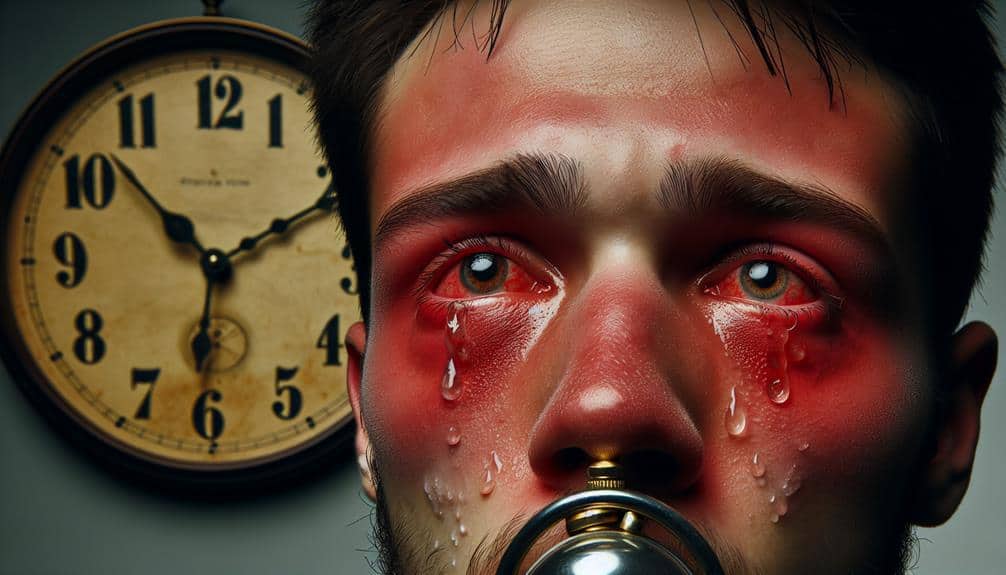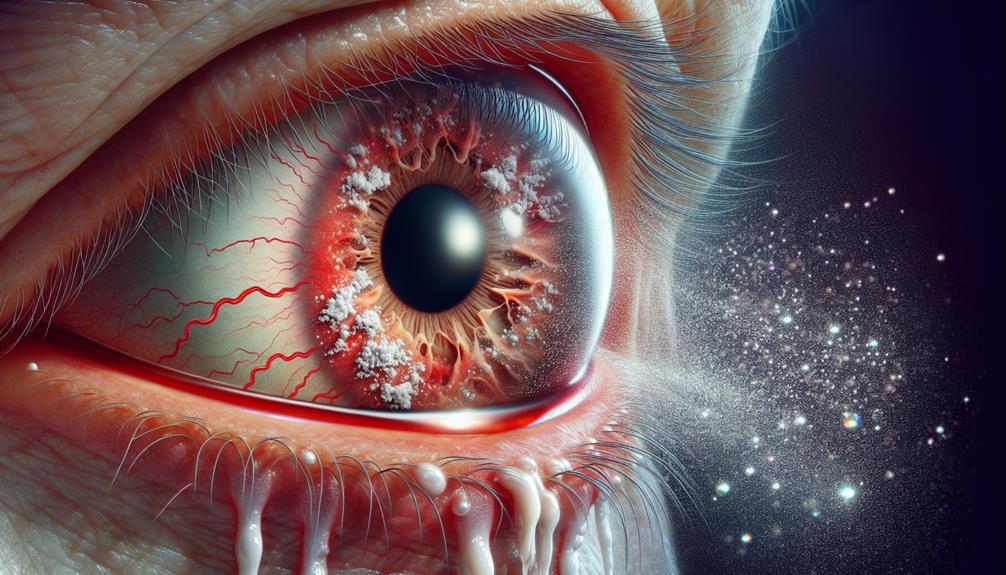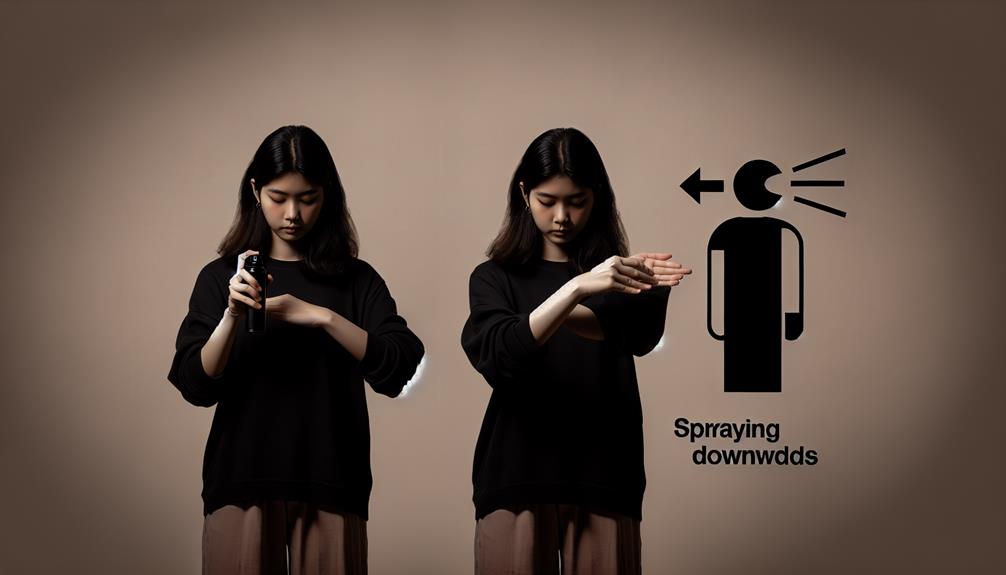Blinded by Pepper Spray: Separating Fact From Fiction

Getting hit by pepper spray feels like getting slapped by a fiery tornado! Your eyes sting, tear up, and you can’t see a thing – but don’t panic. This temporary blindness, caused by capsaicin (the hot stuff from chili peppers), typically only lasts 15 to 30 minutes. It’s like an extreme eye wash, not of utmost importance. While it might seem like forever, rinsing with water really helps. Pepper spray won’t mess up your vision forever, but understanding how to handle it is essential. Curious about what happens next and how to deal with the aftermath? There’s more to uncover!
Immediate Effects

Upon contact with the eyes, pepper spray causes immediate tearing, redness, swelling, stinging, and temporary blindness. Imagine you’re out for a walk, and suddenly, a burst of pepper spray hits your eyes. Instantly, it feels like a thousand tiny needles stabbing you. Tears start streaming uncontrollably down your face, and you can’t see a thing. The intense burning sensation makes you want to rub your eyes, but that only makes it worse.
The capsaicin in pepper spray is the culprit. It activates the pain receptors in your eyes, causing that unbearable stinging and swelling. Your eyelids swell up like balloons, making it feel like you’ve just been hit by a truck. The redness and irritation are no joke either; it’s like having a super bad case of pink eye times ten.
You might find yourself stumbling around, unable to see clearly, and feeling completely helpless. It’s not just about the pain; it’s also the sheer shock of suddenly losing your vision that can be so disorienting. Although these effects don’t last forever, they can make those few moments feel like an eternity. It’s a harsh reminder of just how powerful pepper spray can be.
Temporary Blindness
Imagine this: temporary blindness from pepper spray leaves you unable to see, adding to the already overwhelming pain and disorientation.
Envision this: your eyes burn like they’re on fire, tears streaming down uncontrollably, and you can’t even keep them open. It’s like a scene from a nightmare, all thanks to the capsaicin in the pepper spray irritating your eye’s mucous membranes.
The vision impairment is intense but thankfully, it’s not permanent. Typically, this temporary blindness lasts between 15 to 30 minutes. So, while it feels like an eternity, rest assured, it’s not forever.
The searing pain, coupled with the inability to see, makes those minutes seem like the longest in your life. It’s like you’re trapped in a foggy, burning haze.
Proper decontamination is your best friend here. Flushing your eyes with copious amounts of water can help reduce the duration of this distressing experience. Envision a firefighter dousing flames; that’s what your eyes need. This simple act can drastically cut down the time you’re stuck in this painful limbo. Though it’s a rough ride, knowing it’s temporary can at least offer a glimmer of hope amidst the chaos.
Long-Term Visual Impact

Contrary to popular fears, studies show that pepper spray doesn’t cause permanent blindness or long-term visual problems. Sure, it feels like your eyes are on fire, and you might think you’ll never see again, but rest assured, the effects are temporary.
Most people experience intense burning, tearing, and temporary blindness, but these symptoms typically resolve without lasting damage. When used correctly, especially by trained law enforcement officers, pepper spray’s risk of long-term visual impact is minimal. They know how to deploy it effectively, aiming to control a situation without causing permanent harm.
Plus, medical professionals have specific treatments to quickly alleviate symptoms and prevent any potential long-term issues. If you ever find yourself on the receiving end of pepper spray, remember that the worst part is temporary. The burning sensation and blurry vision will fade.
Training and protocols for handling pepper spray incidents are designed to minimize risks, so lasting visual impairment is rare. So, while it’s certainly an unpleasant experience, you don’t have to worry about losing your vision for good. Just hang in there and let the professionals help you out.
Role of Capsaicin
Understanding the temporary effects of pepper spray naturally leads us to examine its active ingredient: capsaicin. Derived from chili peppers, capsaicin is the fiery compound that makes your mouth feel like it’s on fire after a bite of spicy food. But in pepper spray, it’s concentrated to levels that can surpass even the heat of the Himalayan ghost pepper. Imagine that peppery heat in your eyes! Yikes!
Commercial-grade pepper sprays pack a punch with capsaicin content ranging from 10 to 20 percent. This isn’t just to make you cry—it triggers immediate effects like tearing, redness, swelling, stinging, and even temporary blindness. These intense reactions are why pepper spray is so effective for self-defense and law enforcement.
Oleoresin capsicum, the oily resin extracted from peppers, is the source of this capsaicin. It’s like the pepper’s superpower, and when it hits your eyes, it’s game over. Different products like mace, bear spray, and pepper spray vary in capsaicin potency. So, while bear spray might send a grizzly running, a lower concentration might be enough to stop an attacker in their tracks.
In short, capsaicin is the spicy superhero behind pepper spray’s powerful punch!
Safety Studies

When you think about pepper spray, you might wonder just how safe it really is. Studies show it’s mostly non-toxic and doesn’t mess with your breathing much, but there’s a catch—officers using it often get hurt more than the suspects!
Plus, there’s always the worry about long-term effects popping up, making safety studies a real mixed bag.
Health Impact Analysis
Drawing from extensive safety studies, the health impact of pepper spray on both suspects and officers reveals a detailed and somewhat mixed picture. On one hand, studies show that pepper spray generally causes minimal respiratory issues and very few deaths. That might make you breathe a sigh of relief, right? But wait, there’s more to the story.
Interestingly, research indicates that officers using pepper spray face a higher risk of injury compared to the suspects they’re trying to subdue. Sounds ironic, doesn’t it? You’re out there trying to keep the peace, and bam, you’re the one getting hurt. Plus, there are growing concerns about the long-term health effects on officers. Imagine dealing with lingering health problems just because you did your job!
The National Institute of Justice has guidelines to minimize these risks, but the reality is, things are still a bit intricate. Detailed evaluations give us mixed results on injuries sustained by suspects and the risks officers take when they use pepper spray. It’s like opening a can of worms, only to find out there’s a whole lot more inside than you expected.
Efficacy and Limitations
Pepper spray might seem like a reliable tool for law enforcement, but its effectiveness and safety are far from guaranteed. Studies show minimal impact on respiratory function, with few deaths reported. However, using pepper spray increases the risk of injury for officers compared to other less-lethal weapons. This might surprise you, but it’s true! Disproportionate injuries among officers are a real concern, shedding light on the limitations of this so-called ‘safe’ weapon.
| Pros | Cons |
|---|---|
| Minimal impact on respiratory function | Increased risk of injury for officers |
| Few deaths reported | Potential negative long-term effects |
| Regulations by National Institute of Justice | Disproportionate injuries among officers |
| Portable and easy to use | Ongoing need for safety research |
| Quick incapacitation of suspects | Effectiveness can vary significantly |
Now, let’s talk about those potential long-term effects. Concerns have been raised that negative impacts might emerge over time, which means we really need more research. The National Institute of Justice has set guidelines for the use of pepper spray, but the ongoing examination of its safety and efficacy shows there’s still a lot to learn. So, while pepper spray can be useful, it’s not without its flaws. Let’s not be blinded by its promise!
Myths Vs. Reality
You might’ve heard that pepper spray causes instant blindness, but that’s just a myth. While it burns like crazy and makes your eyes feel like they’re on fire, most studies show it doesn’t cause permanent damage.
But don’t get too comfortable—using it too much can hurt your eyes for good, so it’s super important to handle it with care.
Instant Blindness Myth
Despite popular belief, pepper spray doesn’t cause instant blindness but rather induces temporary vision impairment through tearing and irritation. Imagine getting hit with pepper spray—your eyes instantly start watering, stinging like crazy, and it feels like you can’t see a thing. But don’t worry, it’s not permanent.
Here are some key points about pepper spray’s effects on vision:
- Temporary Effects: The effects on your vision are short-lived, typically lasting about 15 to 30 minutes. So, while it feels awful, it’s not forever.
- Proper Rinsing: Flushing your eyes with water and avoiding rubbing them can help minimize the discomfort and speed up recovery. Think of it like washing out soap that got in your eyes but with more urgency.
- Scientific Backing: Studies and medical experts confirm that immediate blindness from pepper spray is a myth. It’s more like a really intense eye wash.
- Myth Debunking: Understanding these facts can help dispel the fear of permanent blindness, replacing it with knowledge of temporary irritation.
Permanent Damage Reality
While the temporary effects of pepper spray are uncomfortable, it’s important to address the myths surrounding its potential for causing permanent damage. You might’ve heard horror stories about people going blind forever after being sprayed, but let’s set the record straight. There’s no conclusive evidence that pepper spray causes permanent blindness. Studies show that when used correctly, pepper spray doesn’t lead to long-term visual problems. So, take a deep breath; your eyes aren’t doomed.
Proper training for law enforcement is essential in the safe and effective use of pepper spray. Officers need to understand how to use it without causing unnecessary harm. And here’s a tip: if you ever find yourself on the wrong end of a pepper spray canister, don’t rub your eyes! It might seem like the natural thing to do, but it only makes the pain worse.
Emergency medical technicians (EMTs) are like superheroes in this scenario. They’ve specialized treatments to help alleviate the symptoms of pepper spray exposure. So, while the initial sting feels like a thousand angry bees, know that relief is on its way. Your eyes will thank you later.
Proper Usage

Proper usage of pepper spray requires thorough training to minimize risks and guarantee its effectiveness. You can’t just grab a can and start spraying; there’s way more to it. For one, you need to know the right distance and angle to use. If you’re too close or too far, it won’t work like you want it to. Plus, the wind can blow it back in your face, which is definitely not what you want.
Here’s a quick rundown to help you out:
- Distance Matters: Aim for about 3 to 10 feet from your target. Too close, and you might miss; too far, and it loses its punch.
- Check the Wind: Always spray with the wind at your back. Otherwise, you could end up crying alongside your attacker.
- Short Bursts: A quick 1-2 second burst is all you need. Holding the trigger down wastes spray and might leave you defenseless.
- Maintenance: Regularly test your pepper spray to make sure it’s working. You don’t want it to fail when you really need it.
Law Enforcement Training
Law enforcement officers undergo thorough training to master the safe and effective use of pepper spray in various situations. Imagine you’re an officer, gearing up for a training session. You don’t just engage in comprehensive programs to make sure you know exactly what you’re doing.
First, you’ll learn the nuts and bolts: how to deploy the spray, the best techniques for hitting your target, and the effects it has on both the body and mind. It’s not just about aiming and spraying; it’s about understanding when and why to use it.
Situational awareness is key—you’ve got to assess quickly if pepper spray is the best option and who your target should be.
But that’s not all. The training doesn’t stop once you’ve aced the basics. Law enforcement officers get regular updates on new research, legal rules, and best practices. This keeps you sharp and ensures you’re using the most effective and safest methods.
First Aid Measures

After mastering the use of pepper spray, it’s essential to know how to administer first aid if you or someone else gets exposed.
It’s no joke—pepper spray can cause intense pain and temporary blindness. Here’s what you need to do to handle it like a pro:
- Blink Rapidly: First, blink rapidly to help flush out the irritant. It might feel like you’re batting your eyes at a swarm of bees, but trust me, it works.
- Wash Up: Use hand soap or baby shampoo to wash your hands and face. These mild cleansers help remove the pepper spray without causing more irritation. Avoid rubbing your eyes like you’re trying to scratch an itch; it’ll only make things worse.
- Avoid Touching: Keep your hands away from the affected areas. Rubbing your eyes or face can spread the pepper spray, making the pain even more unbearable. Yes, it hurts, but resist the urge.
- Seek Medical Help: If the symptoms stick around or you’re worried, get professional medical attention. They’ve got specialized treatments that can help alleviate the pain and irritation.
Legal Considerations
When you’re considering carrying or using pepper spray, it’s crucial to understand the legal ramifications that come with it. Sure, it seems like a handy self-defense tool, but misusing it can land you in hot water. Excessive force is a big no-no, and courts take this seriously. You could face restrictions, fines, or even more severe consequences if you’re not careful.
The National Institute of Justice has laid out specific guidelines for law enforcement, and you should be aware of them too. These rules are there for a reason—they help keep everyone safe and ensure pepper spray is used appropriately. Legal cases and ethical considerations have significantly impacted police use of force policies, and these same principles apply to civilians.
Court decisions have shaped how pepper spray is used, and these rulings influence what’s permissible. Law enforcement practices have evolved, with some agencies opting for other methods due to legal and regulatory changes. It’s part of why pepper spray isn’t as popular as it once was among officers.
Frequently Asked Questions
What Percent of People Are Not Affected by Pepper Spray?
Around 10-20% of people might not feel the full effects of pepper spray. This genetic resistance means their pain tolerance or physiological response varies. Proper training and higher capsaicin concentrations can improve effectiveness on most individuals.
What Are the Psychological Effects of Pepper Spray?
You might suffer emotional trauma from pepper spray, including panic, fear, and anxiety. The intense sensory overload can lead to feelings of vulnerability and a loss of control, sometimes causing long-term psychological distress and avoidance behaviors.
What Neutralizes Pepper Spray in Eyes?
To neutralize pepper spray in your eyes, rinse with saline solution or clean water. Don’t fall for the milk myth; it’s not effective. Blink rapidly and avoid rubbing. Seek medical attention if symptoms persist or worsen.
Has Pepper Spray Ever Saved Anyone?
Yes, pepper spray has saved lives. You’ll find countless self-defense stories where victims used it to escape attackers. Its effectiveness in stopping aggressors and preventing harm has made it an essential tool for personal safety.


I like this blog very much, Its a rattling nice place
to read and obtain info.Blog monry